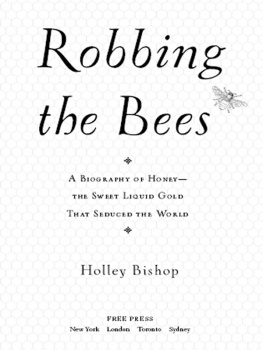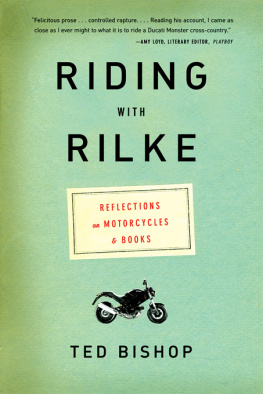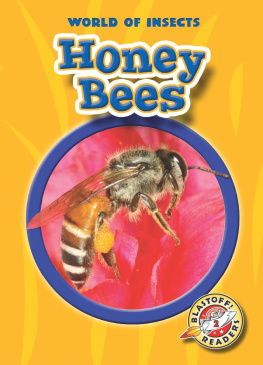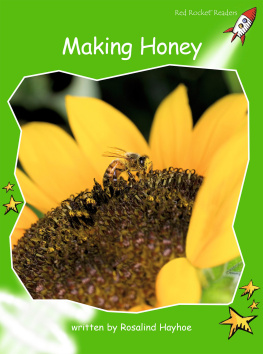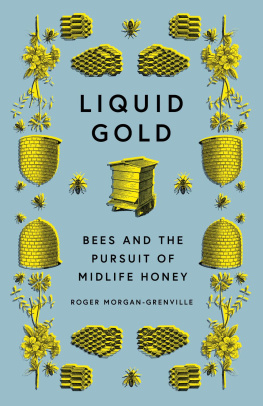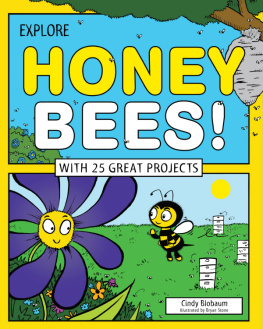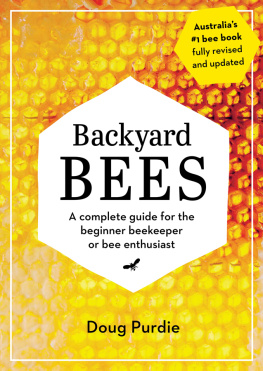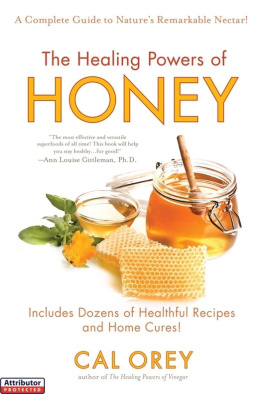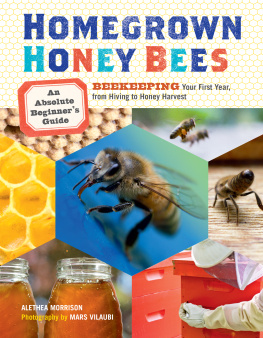FREE PRESS and colophon are trademarks of Simon & Schuster, Inc.
Library of Congress Cataloging-in-Publication Data Bishop, Holley.
Robbing the bees : a biography of honey the sweet liquid gold that seduced the world / Holley Bishop.
p. cm.
1. Honey. I. Title.
SF539.B57 2005
638.16dc22 2004056386

Introductions

For he on honey-dew hath fed,
And drunk the milk of Paradise.
Samuel Taylor Coleridge, Kubla Khan
Everyone should have two or three hives of bees.
Bees are easier to keep than a dog or a cat.
They are more interesting than gerbils.
Sue Hubbell, A Book of Bees
Nobody disputes the role of dogs as mans best friend, but a
convincing argument can also be made for the honey bee.
Martin Elkort, The Secret Life of Food
U ntil six years ago, I had no acquaintance with bees or honey. No childhood memories of painful stings while playing in the yard or climbing a tree, nor neighborhood friends who could boast of such a dramatic experience. There were no eccentric suburban beekeepers to spy on in my early days, no busy oozing tree nests, and never an ounce of honey in the kitchen of the house where I grew up. Preferring the Hardy boys and Nancy Drew to Winnie-the-Pooh, I had not learned to appreciate bees or honey. Bees were a vague, somewhat menacing presence, like malarial mosquitoes or the bogeyman. I had never personally met any and was perfectly happy to keep it that way.
Then, as a harried adult in need of a peaceful getaway, I bought a house in Connecticut two hours north of my cramped rental apartment in New York City. I fell in love with the landscape and solitude of the country, with the shade of giant maples instead of skyscrapers, and with the sounds of woodpeckers and doves waking me in the morning rather than the roar and honk of traffic. The house is over two hundred years old, a quaint brown clapboard colonial, rich in history and nature, which I set out to explore. Soon, I learned that my little haven, with its steep woods, rocky ledges, and spring-fed cattailed pond, had once been a tobacco farm.
Giddy with fresh air and a pioneering do-it-yourself fever, I fantasized about becoming some kind of farmer myself. I toyed with visions of a giant vegetable garden, an orchard, and a produce stand. I thought about acquiring sheep and making cheese and sweaters. Somewhere I read that one acre of grazing land can support one dairy cow and did the math on an unlikely herd of cattle. In the midst of my very improbable farm dreams (this was, after all, a part-time project, and I am essentially lazy), I went to visit my friend Ace, an expert in part-time projects. He introduced me to two white boxes of bees he kept in a meadow near his house. Immediately I was captivated by the idea of low-maintenance farm stock that did the farming for you and didnt need to be walked, milked, or brushed. The amount of gear and gadgets involved also appealed.
Ace handed me a plastic bear full of his most recent harvest, and when I tilted it to my mouth, head back, eyes closed, I really experienced honey for the first time, standing next to its creators. In that glistening dollop, I could taste the sun and the water in his pond, the metallic minerals of the soil, and the tang of the goldenrod and the wildflowers blooming around the meadow. The present golden-green moment was sweetly and perfectly distilled in my mouth. When I opened my eyes, tree branches and blossoms were suddenly swimming and swaying with bees that I had somehow not noticed before. Bees hopped around blooms in a delicate looping minuet. Determined to have sweet drops of honey and nature on my tongue on a more regular basis, I resolved to host bees on my own property. Keeping bees was clearly the most exquisite way to learn about my land, farm it, and taste its liquid fruits. As visions of sheep and cows faded away, I dropped my head back again and opened my mouth for more honey. That is how my love affair with bees and their magical produce began.
Like most love affairs, it quickly got obsessive. I started to see bees and honey everywhere, and everything reminded me of them. Honey suddenly appeared in every aisle of my supermarket and in the bubbles of my bath. The condiment packets at Starbucks were love letters from the hive. In the city, I saw Busy Bee courier services, Bee-Line moving companies, and bees dancing about the flowers of the medians on Park Avenue. When the initial infatuation had worn o., I did a little background check. Reading everything I could on beekeeping and bees, I became a little more enamored with every detail I uncovered about this humble creatures illustrious past. Most of the books I found on the subject were dated and musty, but their sense of fascination, which I now shared, was fresh and timeless.

Reverence for the bee is as old as humanity. Bees, in fact, were on this planet long before humanity existed. Ancient civilizations believed that bees were divine messengers of the gods, or deities themselves. Kings and queens of the Nile carved symbols of them into their royal seals, and the Greeks of Ephesus minted coins with their images. Emperor Napoleon embroidered the mighty bee into his coat of arms as an emblem of power, immortality, and resurrection. One day at the New York Public Library, while I was researching bees, one of my subjects blithely and loudly explored the reading room, causing widespread consternation. I felt thrilled by this visitation from the gods.
Honey was humanitys only sweetener for centuries, and historically seekers had gone to great and painful lengths to obtain their sweet liquid grail. It seemed to me, as I observed our often unnatural world of modern conveniences and sugar substitutes, that bees and honey, like poetry and mystery, had become sadly neglected and unappreciated. I had taken them for granted myself, but no more. I read dozens of journals and books about the bee, enough to realize that I was just beginning to grasp her vast repertoire of marvels. The glob of precious honey that I had poured into my mouth at Aces was the lifes work of hundreds of bees, a unique floral ode collected from thousands of blossoms in a poetic foraging ritual that has not changed in millions of years. Honeybees are mostly female; they communicate by dancing; and collectively they travel thousands of miles to produce a single communal pound of honey. They live for only several weeks and heroically die after delivering their dreaded, venomous sting. Bees shape the very landscape in which we all live by cross-pollinating and changing the plants that nourish them. After decades of living in honeyless ignorance I added these divine insects and their delicious produce to my recommended daily allowance of magic and wonder.

